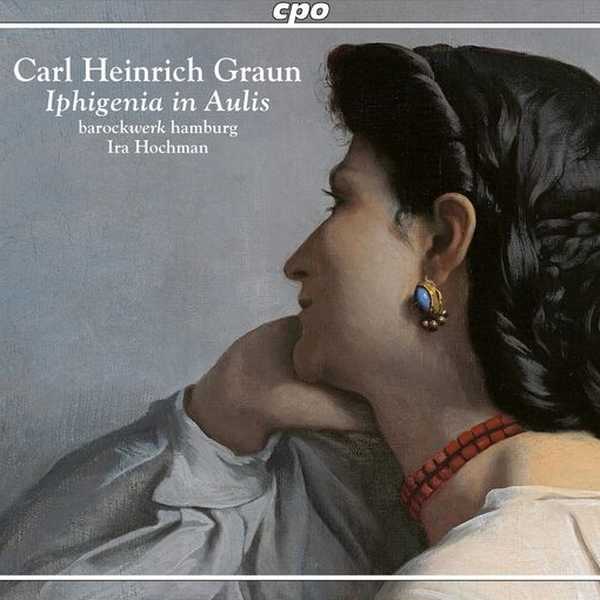
Composer: Carl Heinrich Graun
Performer: Santa Karnīte, Andreas Heinemeyer, Terry Wey, Hanna Zumsande, Geneviève Tschumi, Mirko Ludwig, Dominik Wörner, Barockwerk Hamburg
Conductor: Ira Hochman
Number of Discs: 2
Format: FLAC (tracks)
Label: CPO
Catalogue: 555475-2
Release: 2023
Size: 598 MB
Recovery: +3%
Scan: yes
Iphigenia in Aulis
CD 01
Act I
01. Overture
02. Wann stillt sich deiner Zähren Fluß?
03. Himmel, hegst du für mich Armen
04. Mit seinem Feinde herzhaft kämpfen
05. Armes Herz, du bist verloren
06. Liebsten Kinder, trauet nicht
07. Schönste Seele, deine Lippen
08. Treuer Liebe reine Flammen
09. Sollte Treu im Lieben sein?
10. O ihr verliebten Venus-Sieger
Act II
11. Kann ich dir das Leben geben
12. Ach Iphigenia
13. Treuloses Herz, verkehrter Sinn
14. Schweren, Lügen, Triegen
CD 02
Act II
01. Schönste Blumen, meine Wonne
02. Wo ungerechte Götter thronen
03. Stürmet noch einmal, ihr Riesen
04. Mein Geliebtes frei zu machen
05. Augen, machet euch bereit
06. Wertste Seele, gute Nacht
Act III
07. Unzählbar ist der Sternen Heer
08. Klage, die man von sich schicket
09. Geliebte Seele, weine nicht
10. Lebe wohl, ich muß dich lassen
11. Die Mädgens sind recht wunderlich
12. Nach wilder Wellen Brausen
13. Es weiche, es fliehe der Kummer der Seelen
For years, barockwerk hamburg has enjoyed great popularity, especially for the revival of previously unpublished works from Hamburg’s musical history. Now the ensemble has recorded Iphigenia in Aulis by Carl Heinrich Graun after the libretto arrangement by Georg Caspar Schürmann for cpo. The story of the king’s daughter Iphigenia, who is to be sacrificed by her father Agamemnon, is one of the classic tragedies of Greek antiquity that continues to inspire the theater to ever new interpretations. At the age of just 24, Carl Heinrich Graun also became enthusiastic about the material and composed “Iphigenia in Aulis” 290 years ago. His youthfully fresh and colorful music was last heard on the stage of Hamburg’s Gänsemarkt Opera in 1731. The work centers on Iphigenia’s voluntary and selfless sacrifice in times of social crisis. Fatherly love and royal duty, loyalty and betrayal, irony and intrigue, and a wedding as the final chord provide all the ingredients for an opulent and varied baroque opera. Although the surviving manuscripts unfortunately lack the music for all the recitatives, the three choruses, the final entrance of Diana with all the participants, and the final chorus, there is enough highly inspiring music, including the overture, as well as 35 arias, and it would be more than a pity to let this extensive work continue to lie unperformed in the archives.



